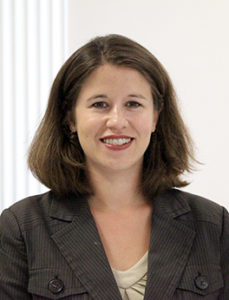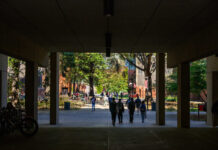
Professor Jamie Abrams’ family law class begins with a knock on the door. It’s a client filing for divorce.
From that moment on, Abrams’ students are immersed in a semester-long simulation of divorce proceedings.
“It’s messy. It’s emotional. We’re unsure what we’re going to do about it — but that’s how an actual client intake would go,” Abrams says.
Thanks to a Wyatt Faculty Development Award promoting innovation in teaching, Abrams was able to style her family law class as a “flipped classroom” three years ago. Unlike traditional law school classes, which emphasize readings and discussion, a flipped classroom focuses on hands-on skills building. The goal is to produce graduates who are practice-ready and is in line with the American Bar Association’s requirement of six hours of experiential learning.

The class is divided into two sections, each representing a spouse in the case. They discuss seven different issues throughout the semester, including child custody and child support.
Collaboration and analysis are major parts of the course, and those skills take time to build. Abrams has found she must strip the course down to the essentials of family lawyering.
“I do more with less content,” she says. “But they move to a higher level of mastery of those concepts.”
And Abrams has had to reframe the classroom experience in other ways — it’s very hard for students to multitask in this class, and it’s difficult to make up for missed sessions. But because the lessons are so intensive, students can view them as study sessions as well as lessons.
The flipped classroom has gotten positive feedback from students, who report feeling more prepared to take the bar exam because of their hands-on experience.
Students get feedback on the performance three times a semester, giving them opportunities to grow throughout the class. In the final exam, they must cover the seven topics for a new client using the skills they’ve built in the previous months.
And the final exam results?
“Stellar,” Abrams says. “They’re not spewing out abstract concepts — they’re lawyering.”
Without the flipped classroom, it’s entirely possible that family law students could leave law school having exclusively read appellate opinions with no idea of the human elements at play in a case.
“Students might know what the law says, but not what the client wants,” Abrams says. “It gives them a chance to see what family law is like on a daily basis.”
This article originally ran in the July 2016 issue of Bar Briefs.































